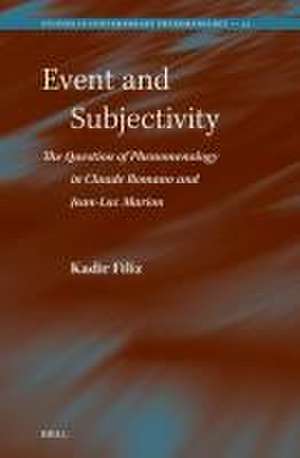Event and Subjectivity: The Question of Phenomenology in Claude Romano and Jean-Luc Marion: Studies in Contemporary Phenomenology, cartea 25
Autor Kadir Filizen Limba Engleză Hardback – 19 dec 2023
It proposes a phenomenological version of the event that transforms the definition of phenomenon, subjectivity and phenomenology itself in order to do justice to the phenomenality of the event.
At the same time, Event and Subjectivity is the first book on Claude Romano’s understanding of phenomenology in English. It also offers a fresh reading of the phenomenology of Jean-Luc Marion by highlighting the phenomenon of the event.
Din seria Studies in Contemporary Phenomenology
- 18%
 Preț: 832.02 lei
Preț: 832.02 lei - 18%
 Preț: 712.36 lei
Preț: 712.36 lei - 18%
 Preț: 780.86 lei
Preț: 780.86 lei - 18%
 Preț: 605.73 lei
Preț: 605.73 lei - 18%
 Preț: 1119.65 lei
Preț: 1119.65 lei - 18%
 Preț: 865.53 lei
Preț: 865.53 lei - 18%
 Preț: 741.15 lei
Preț: 741.15 lei - 18%
 Preț: 669.99 lei
Preț: 669.99 lei - 18%
 Preț: 705.31 lei
Preț: 705.31 lei - 18%
 Preț: 659.86 lei
Preț: 659.86 lei - 18%
 Preț: 1000.99 lei
Preț: 1000.99 lei - 18%
 Preț: 575.82 lei
Preț: 575.82 lei - 18%
 Preț: 852.67 lei
Preț: 852.67 lei - 15%
 Preț: 516.34 lei
Preț: 516.34 lei - 18%
 Preț: 674.66 lei
Preț: 674.66 lei - 18%
 Preț: 890.24 lei
Preț: 890.24 lei - 18%
 Preț: 793.16 lei
Preț: 793.16 lei - 18%
 Preț: 654.11 lei
Preț: 654.11 lei
Preț: 734.02 lei
Preț vechi: 895.15 lei
-18% Nou
Puncte Express: 1101
Preț estimativ în valută:
140.46€ • 150.19$ • 117.11£
140.46€ • 150.19$ • 117.11£
Carte indisponibilă temporar
Doresc să fiu notificat când acest titlu va fi disponibil:
Se trimite...
Preluare comenzi: 021 569.72.76
Specificații
ISBN-13: 9789004689534
ISBN-10: 9004689532
Dimensiuni: 155 x 235 mm
Greutate: 0 kg
Editura: Brill
Colecția Brill
Seria Studies in Contemporary Phenomenology
ISBN-10: 9004689532
Dimensiuni: 155 x 235 mm
Greutate: 0 kg
Editura: Brill
Colecția Brill
Seria Studies in Contemporary Phenomenology
Notă biografică
Kadir Filiz completed his Ph.D. (2023) at Radboud University in Nijmegen, the Netherlands. He has published articles and translations into Turkish.
Cuprins
Acknowledgments
Series Editor’s Foreword
Introduction
1 The Event in Contemporary Phenomenology
2 Some Methodological and Hermeneutical Issues
Introduction to Part 1
1 The Event in the Phenomenology of Givenness
1.1 The Phenomenology of Givenness
1.1.1 The Phenomenological Reduction
1.1.2 The Determinations of Givenness: Given Phenomena
1.1.3 The Gift
1.1.4 The Saturated Phenomenon
1.2 Phenomenality: Objectness and Eventness
1.2.1 Two Uses of the Event: The Determination of a Given and a Saturated Phenomenon
1.2.2 The Event as a Pole of Phenomenality
1.2.3 Eventness or Objectness: The Role of Hermeneutics
1.3 Conclusion
2 The Phenomenality of the Event in Evential Hermeneutics
2.1 The Heideggerian Shadow
2.1.1 The Methodological Paths of Heidegger and Romano
2.1.2 Romano’s Account of the Heideggerian Ereignis
2.2 The Four Distinctive Characteristics of Events
2.3 The Transformation of Phenomenological Notions by the Phenomenality of the Event
2.3.1 Possibility and the Problem of the World
2.3.2 Time and Temporality
2.3.3 The Experience of the Event
2.4 Conclusion
Introduction to Part 2
3 The Adonné
3.1 Aporias of the Subject
3.1.1 The Four Aporias of Subjectivity
3.1.2 Dasein as an Heir of the Subject
3.2 The Replacement of the Subject by the Adonné
3.2.1 The Analytic of the Adonné
3.2.2 The Temporality of the Adonné
3.2.3 The Call and Response
3.2.4 Ego and Reduction
3.3 Conclusion
4 The Advenant
4.1 Before the Subject
4.1.1 Birth
4.1.2 The Subject and the Advenant
4.1.3 Dasein and the Advenant
4.1.4 The Selfhood of the Advenant
4.1.5 How does the Advenant Respond to Events?
4.1.6 The Temporality of the Adventure
4.2 Transcendentalism and the Advenant
4.2.1 The Transcendentalism of Dasein
4.2.2 Reduction as the Sceptical Problem
4.2.3 The Advenant in the “Real” World
4.3 Conclusion
Conclusion
1 Some General Remarks about the Event in Phenomenology
2 What do the Event and Its “Subjectivities” Bring Forth?
2.1 A Realistic Conception of Phenomenality
2.2 A New Way of Phenomenological Rationality
Bibliography
Index
Series Editor’s Foreword
Introduction
1 The Event in Contemporary Phenomenology
2 Some Methodological and Hermeneutical Issues
Part 1: What is the Event?
Introduction to Part 1
1 The Event in the Phenomenology of Givenness
1.1 The Phenomenology of Givenness
1.1.1 The Phenomenological Reduction
1.1.2 The Determinations of Givenness: Given Phenomena
1.1.3 The Gift
1.1.4 The Saturated Phenomenon
1.2 Phenomenality: Objectness and Eventness
1.2.1 Two Uses of the Event: The Determination of a Given and a Saturated Phenomenon
1.2.2 The Event as a Pole of Phenomenality
1.2.3 Eventness or Objectness: The Role of Hermeneutics
1.3 Conclusion
2 The Phenomenality of the Event in Evential Hermeneutics
2.1 The Heideggerian Shadow
2.1.1 The Methodological Paths of Heidegger and Romano
2.1.2 Romano’s Account of the Heideggerian Ereignis
2.2 The Four Distinctive Characteristics of Events
2.3 The Transformation of Phenomenological Notions by the Phenomenality of the Event
2.3.1 Possibility and the Problem of the World
2.3.2 Time and Temporality
2.3.3 The Experience of the Event
2.4 Conclusion
PART 2: Who Experiences the Event?
Introduction to Part 2
3 The Adonné
3.1 Aporias of the Subject
3.1.1 The Four Aporias of Subjectivity
3.1.2 Dasein as an Heir of the Subject
3.2 The Replacement of the Subject by the Adonné
3.2.1 The Analytic of the Adonné
3.2.2 The Temporality of the Adonné
3.2.3 The Call and Response
3.2.4 Ego and Reduction
3.3 Conclusion
4 The Advenant
4.1 Before the Subject
4.1.1 Birth
4.1.2 The Subject and the Advenant
4.1.3 Dasein and the Advenant
4.1.4 The Selfhood of the Advenant
4.1.5 How does the Advenant Respond to Events?
4.1.6 The Temporality of the Adventure
4.2 Transcendentalism and the Advenant
4.2.1 The Transcendentalism of Dasein
4.2.2 Reduction as the Sceptical Problem
4.2.3 The Advenant in the “Real” World
4.3 Conclusion
Conclusion
1 Some General Remarks about the Event in Phenomenology
2 What do the Event and Its “Subjectivities” Bring Forth?
2.1 A Realistic Conception of Phenomenality
2.2 A New Way of Phenomenological Rationality
Bibliography
Index
